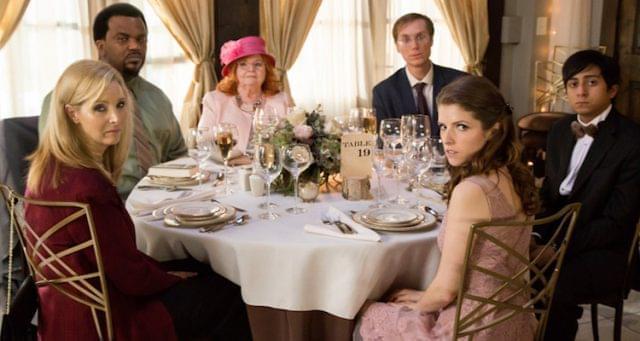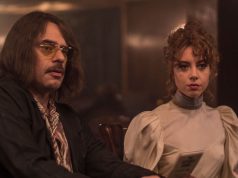
In “Table 19,” the title piece of furniture is at the back of a wedding reception, past the tables reserved for guests who matter. The outcasts back here are the people who were invited out of obligation on the assumption they wouldn’t actually come. You feel for them immediately, a band of underdogs who’ve been wronged before the story even begins.
It helps that their leader is Anna Kendrick, a plucky ray of sunshine even when (especially when?) she’s playing a hot mess. Here, in Jeffrey Blitz’s shaggy, formulaic comedy, she is Eloise, a lifelong friend of the bride who was going to be maid of honor until just recently, when she got dumped — via text message, no less — by her boyfriend, Teddy (Wyatt Russell), who is the bride’s brother and the best man. Eloise struggled with whether to still come to the wedding, and doesn’t feel reassured when she meets her table-mates:
– Jo (June Squibb), who was Teddy and the bride’s nanny when they were young and is now largely forgotten by them;
– Walter (Stephen Merchant), a grinning, gawky English cousin who definitely wasn’t recently in prison and then a halfway house, nope;
– Rezno (Tony Revolori), an intense adolescent boy seeking romance, with his unseen mother (Margo Martindale) on the phone as his wingman;
– The Kepps, Jerry (Craig Robinson) and Bina (Lisa Kudrow), who own a diner, are acquaintances of the groom’s restaurateur father, and have lost the spark in their marriage.
They all eventually come to accept that Table 19 is not a place of honor, but they’re less concerned about the individual indignities they’ve suffered than with helping Eloise avenge hers. Teddy, a cheerful blond dope, already has a new girlfriend (Amanda Crew) and doesn’t seem nearly sorry enough for dumping Eloise. A charming Englishman (Thomas Cocquerel) is introduced into the story as a potential replacement, teasing us with two possible outcomes: Eloise reconciles with Teddy, or she goes off with the new guy. In the meantime, we discover that Eloise and Teddy’s breakup had more nuance to it than we first realized.
The supporting characters are likable and provide fodder for some good running jokes, but they’re only interesting insofar as they affect Eloise, the only character who really matters. The Kepps’ marriage problems, for example, though handled maturely, only serve the film by filling it out to feature length. Walter’s efforts not to discuss his criminal past are funny (he improvises lies but is very bad at improvising), but there’s no payoff. Several other lesser threads are also left dangling.
But the movie pulls a neat trick in the last 20 minutes or so, rallying to provide a happy, satisfying ending that sends us out of the theater thinking we saw something better than we did. Blitz’s previous film, “Rocket Science,” from 2007 (he’s been directing TV since then), was similarly funny but overly quirky. Maybe one every 10 years is a good pace for someone who makes charming but inconsequential date-night comedies.
B (1 hr., 29 min.; )





